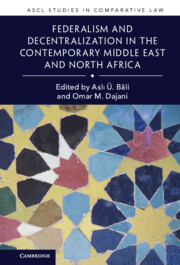Book contents
- Federalism and Decentralization in the Contemporary Middle East and North Africa
- ASCL Studies in Comparative Law
- Federalism and Decentralization in the Contemporary Middle East and North Africa
- Copyright page
- Contents
- Contributors
- Acknowledgments
- 1 Introduction
- Part I Theoretical and Comparative Context
- Part II Decentralization and Governance Reform
- Part III Decentralization and Self-determination
- 9 Autonomy beyond the State
- 10 The Devil Is in the Details
- 11 Turkish Kurdistan
- 12 Control, Responsibility, and the Israeli-Palestinian Decentralization Debacle
- 13 “Stuck Together”
- 14 “Dans ses Frontières Authentiques”?
- Part IV Decentralization, Conflict, and State Fragmentation
- Part V Conclusions
- Index
13 - “Stuck Together”
Can a Two-State Confederation End the Israeli-Palestinian Conflict?
from Part III - Decentralization and Self-determination
Published online by Cambridge University Press: 15 January 2023
- Federalism and Decentralization in the Contemporary Middle East and North Africa
- ASCL Studies in Comparative Law
- Federalism and Decentralization in the Contemporary Middle East and North Africa
- Copyright page
- Contents
- Contributors
- Acknowledgments
- 1 Introduction
- Part I Theoretical and Comparative Context
- Part II Decentralization and Governance Reform
- Part III Decentralization and Self-determination
- 9 Autonomy beyond the State
- 10 The Devil Is in the Details
- 11 Turkish Kurdistan
- 12 Control, Responsibility, and the Israeli-Palestinian Decentralization Debacle
- 13 “Stuck Together”
- 14 “Dans ses Frontières Authentiques”?
- Part IV Decentralization, Conflict, and State Fragmentation
- Part V Conclusions
- Index
Summary
The aim of this chapter is to describe, and offer a critical assessment of, confederal approaches to resolving the conflict in Israel-Palestine. We review why prospects for the conventional two-state solution have declined and what other models have been advanced as alternatives. After placing confederation in historical and theoretical context, we then describe a range of confederal proposals for Israel-Palestine. We conclude by exploring process and institutional design considerations presented by confederation as a framework for resolving the Israeli-Palestinian conflict.
Keywords
- Type
- Chapter
- Information
- Publisher: Cambridge University PressPrint publication year: 2023

